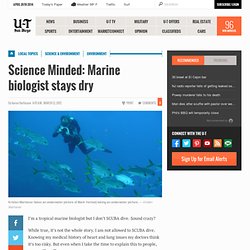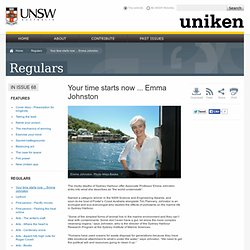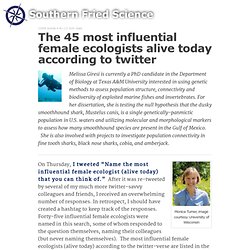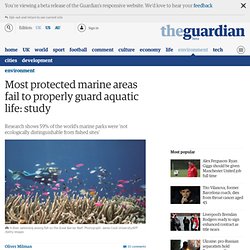

Articles abt MarMam + Deep Diving. MPA articles. Ocean Acidification Awareness Game. Internship/SummerCourse Marbio. Science Minded: Marine biologist stays dry. I’m a tropical marine biologist but I don’t SCUBA dive.

Sound crazy? While true, it’s not the whole story. I am not allowed to SCUBA dive. Knowing my medical history of heart and lung issues my doctors think it’s too risky. But even when I take the time to explain this to people, some still scoff. “Aaron, how do you think you can work with corals if you can’t dive? “You don’t dive?” While their comments stung, I’ve learned to smirk them away because I can confidently tell them: I make it work, and it’s not even that hard. Their questions are practical, I suppose—the animals I study live in water that’s at least ten feet deep, so I can’t very well collect them or run experiments in their natural habitat. To get past my limitation I’ve linked up with two highly skilled SCUBA diving scientists, Kristen Marhaver and Mark Vermeij, who make the collections necessary for me to do my work—or better said: to do our work.
Conducting research as a group is the norm, not the exception.
Future Uni. Articles abt General MarBio. MarMam + Bycatch. Vulcanic ash effect on marine ecosystem. Articles about MarMam. Articles about MarMam + Noise. Your time starts now ... Emma Johnston. The murky depths of Sydney Harbour offer Associate Professor Emma Johnston entry into what she describes as “the world underneath”.

Named a category winner in the NSW Science and Engineering Awards, and soon-to-be host of Foxtel’s Coast Australia alongside Tim Flannery, Johnston is an ecologist and eco-toxicologist who studies the effects of pollutants on the marine life in Sydney Harbour. “Some of the simplest forms of animal live in the marine environment and they can’t deal with contaminants. Some don’t even have a gut, let alone the more complex cleansing organs,” says Johnston, who is the director of the Sydney Harbour Research Program at the Sydney Institute of Marine Sciences.
“Humans have used oceans for waste disposal for generations because they have little emotional attachment to what’s under the water,” says Johnston. “We need to get the political will and resources going to clean it up.” Earliest memory: My artist mother, teaching me how to draw a tree. By Fran Strachan.
The 45 most influential female ecologists alive today according to twitter. Melissa Giresi is currently a PhD candidate in the Department of Biology at Texas A&M University interested in using genetic methods to assess population structure, connectivity and biodiversity of exploited marine fishes and invertebrates.

For her dissertation, she is testing the null hypothesis that the dusky smoothhound shark, Mustelus canis, is a single genetically-panmictic population in U.S. waters and utilizing molecular and morphological markers to assess how many smoothhound species are present in the Gulf of Mexico. She is also involved with projects to investigate population connectivity in fine tooth sharks, black nose sharks, cobia, and amberjack. Monica Turner, image courtesy University of Wisconsin On Thursday, I tweeted “Name the most influential female ecologist (alive today) that you can think of.”
After it was re-tweeted by several of my much more twitter-savvy colleagues and friends, I received an overwhelming number of responses.
News about Marine Mammals. Interesting Journal Articles. Blog Post abt MarMam. Most protected marine areas fail to properly guard aquatic life: study. Most of the world’s protected marine areas are failing to properly protect aquatic life, with many showing few differences from neighbouring areas that are openly fished, an Australian-led study has found.

University of Tasmania research of 87 marine protected areas in 40 countries showed the best marine parks had on average eight times more large fish and 14 times more sharks than fished areas. But the research, published in Nature, found that 59% of the marine parks studied were “not ecologically distinguishable from fished sites”. Researchers identified five key traits of a well-managed marine park – no fish take, well enforced, established for longer than 10 years, larger than 100 square km and isolated by deep water or sand.
Only marine parks with four or all five of these criteria were effectively boosting conservation values, the study found. Among the 26 marine areas studied in Australia, the only place with all five key traits was Middle Reef, near Lord Howe Island.